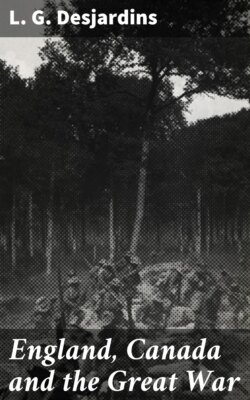Читать книгу England, Canada and the Great War - L. G. Desjardins - Страница 11
На сайте Литреса книга снята с продажи.
The Call To Duty In Canada.
ОглавлениеTable of Contents
Every one knows how the news of the State of War between the British and German Empires were received in our great Canadian Dominion, after the days of anxious waiting which culminated in the rallying of England to the defence of the cause of Freedom and Civilization. When the call for duty was sounded in the Capital of the British Empire, it rolled over the mighty Atlantic, spreading over the length and breadth of Canada, being re-echoed with force in our Province of Quebec.
At once called to prepare for the emergency, the Canadian Parliament met and unanimously decided that the Dominion would, of her own free will and patriotic decision, participate in the Great War. The course of events in Canada, for the last four years, is well known by all. It is recent history.
My special object in condensing in this book the defence which I considered it my duty to make of the just and sacred cause of the British Empire, and her Allies, in the great war still raging with undiminished fury, being to show how I did, to the best of my ability, try to persuade my French Canadian Countrymen where was the true path of duty, and how false and disloyal were the unscrupulous theories of "Nationalism", I must first review the successive movements of public opinion in the Province of Quebec.
In the preceding sentence, I have intently affirmed that the cause of the Allies was that of the whole British Empire. Surely, it should not be necessary to say so, as no truly loyal British subject would for a moment hesitate to come to that patriotic conclusion. Still, however incredible it is, the duty of the British colonies to rally to the flag to defend the Empire and participate in the deadly struggle between Civilization and barbarism, was challenged by the leaders of the "Nationalist school" in the Province of Quebec. Of course, that school never represented more than a small minority of thought and numbers. But, sad to admit, a fanatical minority, in days of trying sacrifices, can do a great deal of injury to a people by inflaming national and religious prejudices. We, French Canadians, have had much to suffer from the unpatriotic efforts of a few to bring our countrymen to take an erroneous view of the situation.
At the opening of the war, the general opinion in the Province of Quebec was without doubt strongly in favor of Canada's participation in the struggle. Any student of the working of our constitutional system knows how the strength of public opinion is ascertained, outside of a general election, in all cases, and more specially with regard to measures of paramount importance when the country has to deal with a national emergency.
The Parliament of Canada is the authorized representative of the Country. Called in a special session, at the very outbreak of the hostilities, they voted unanimously that it was our duty to participate in the war. All the representatives of the Province of Quebec heartily joined with those of all the other Provinces to vote this unanimous decision.
In the light of events ever since, who can now reasonably pretend that the patriotic decision of the Parliament of Canada was not entirely, even enthusiastically, approved by the Canadian people? The press, even in the Province of Quebec, with only one exception of any consequence, was unanimous in its approval of the action of Parliament.
The heads of our Church, the Archbishops and Bishops of the Ecclesiastical Provinces of Quebec, Montreal and Ottawa, in their very important Pastoral Letter on the duties of the Catholics in the present war, positively said:—
"We must acknowledge it—(nous ne saurions nous le dissimuler—): that conflict, one of the most terrific the world has yet seen, cannot but have its repercussion in our country. England is engaged into it, and who does not see that the fate of all the component parts of the Empire is bound with the fate of her arms. She relies upon our support, and that support, we are happy to say, has been generously offered to her both in men and money."
No representative of public opinion, of any weight, outside of Parliament, professional men, leaders of finance, commerce and industry, in the Province of Quebec, raised a word of disapproval at the Parliamentary call to arms.
Not one meeting was called, not one resolution was moved, to oppose the decision of the Canadian Parliament.
Not one petition was addressed to the two Houses in Ottawa against Canada's participation in the war.
Every one in the Province of Quebec knew that participating in the war would entail heavy financial sacrifices, and that the taxation of the country would have to be largely increased to meet the new obligations we had freely decided to incur for the salvation of the Empire and of Civilization.
The Government of the day proposed the financial measures they considered necessary to raise the public revenue which the circumstances required. Those measures were unanimously approved by Parliament. The taxpayers of the country, those of the Province of Quebec like all the others, willingly and patriotically accepted and paid without complaint the new taxes into the public treasury. During more than the three first years of the war, I visited a good part of the Province of Quebec, and addressed several large public meetings. Everywhere my attention was forcibly struck by the prompt willingness of my French Canadian countrymen to bear their share of the financial sacrifices Canada was called upon to make for the triumph of the cause of the Allies.
